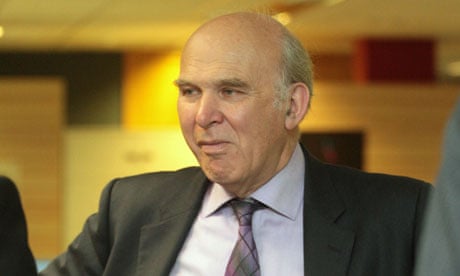Tensions over immigration within the Conservative-Liberal Democrat coalition resurfaced today, when Vincent Cable urged his colleagues not to introduce new border controls that would harm economic growth.
The business secretary spoke out after new figures showed an unexpected 20% rise in net immigration to Britain: 196,000 people arrived in 2009, up from 163,000 the year before.
The government plans a cap on immigration, but as a European Union member it would only be able to cap immigration from outside the EU. But Cable pointed out that the rise in immigration announced yesterday was not caused by an increase in work permits issued to non-EU citizens, but by a fall in the number of people leaving the UK to live overseas.
Cable told the Financial Times: "It's very clear from the figures that the increase in recorded immigration has nothing to do with the number of non-EU work permits issued; they actually declined.
"I've full confidence that my colleagues understand the need for immigration control measures that support business recovery and economic growth."
Cable's comments follow a statement he made last month on a trip to India, when he said: "It's no great secret that in my department and me personally, we want to see an open economy, and as liberal an immigration policy as it's possible to have."
David Cameron made introducing an annual cap on immigration a key issue during this year's election campaign, although he is yet to explain how it would work and what the exact level would be, beyond saying it must be brought under 100,000. The coalition agreement with the Lib Dems says only: "We have agreed that there should be an annual limit on the number of non-EU economic migrants admitted into the UK to live and work. We will consider jointly the mechanism for implementing the limit." So far the government has imposed a cap on work visas for highly-skilled non-EU immigrants, setting this at 24,100 between June 2010 and April 2011, down 1,300 from last year. Under the terms of membership of the EU, the UK could not cap EU immigration.
Employers warned yesterday that the abrupt introduction of a "radical cap" on immigration from next year would lead to major skills shortage in the UK.
The Chartered Institute of Personnel and Development issued the warning after the release of the new figures showing an increase in net migration to Britain, a jump fuelled mostly by 60% fewer Britons leaving the country to live abroad – down from 90,000 to 36,000 – and by a 35% rise in overseas students coming to Britain.
At the same time, the actual number of people coming to work in Britain has continued to decline: there was a fall of 14% recorded in the 12 months to June 2010, which included a 30% fall in new national insurance registrations by Poles and other eastern Europeans.
Britain has become much less attractive to immigrants as a result of the recession and the weakened pound, the Institute of Public Policy Research said.
"The increase in net immigration shown in today's statistics is bad news for the government, given its aim of reducing net immigration to 'tens of thousands' rather than hundreds of thousands," said a briefing from the thinktank yesterday. "With net immigration now rising again, after a period of substantial decline, this objective looks like it is becoming harder to reach."
The Chartered Institute of Personnel and Development said the sharp fall in the number of work-related visas – down by 14% to 161,050 in the year to June 2010 – showed the points-based system introduced by Labour was robust and working.
"The reality for employers is that training workers to plug the UK skills gap is a lengthy task," said Gerwyn Davies of the CIPD. "The abrupt introduction of a radical cap would therefore leave many employers with a bigger skills problem and tempt employers with global operations to offshore jobs, where they can find the skills."
Damian Green, the immigration minister, said the unexpected rise in net migration – the numbers coming to live in the UK minus those leaving – meant the government would now need to re-examine routes outside the points-based system.
"What these figures tell me is that we also need to look at the other routes by which people come into this country, maybe for education, for family reunion reasons and also, in particular, routes that lead to permanent settlement," said Green. "Because hidden in these figures are two very big increases: one, of the number of students coming in, and the other, of the numbers of people settling here and gaining citizenship here."
Although a net migration figure of 196,000 for 2009 is higher than the previous year, it is still well below the peaks of about 220,000 seen in 2005 and 2007 when the flow of migrants from the new EU states – Poland, the Czech Republic and the Baltics – was at its highest.
The official immigration statistics also show a continuing decline in the number of asylum seekers coming to Britain. Only 4,365 arrived between April and June this year – a 29% fall compared with the same period in 2009. The Home Office said two-thirds of the decline was because of a drop in applications from Zimbabwe.
Both the Refugee Council and Refugee Action highlighted figures showing that almost a third of asylum appeals were being allowed and argued this demonstrated that a significant number of asylum claims were being wrongly refused. The welfare groups said that the figure rose to 50% in cases involving people from Somalia, which showed the danger of the government cutting legal aid for asylum appeals.

Comments (…)
Sign in or create your Guardian account to join the discussion